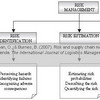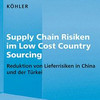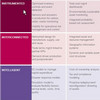 Maintaining a blog with more than 500 posts is a daunting task. While a post itself may still be OK, 8 years after it was written, the links in it most likely are not. When I revived my blog after three years of hibernation I knew this was going to be a a major problem. It was a problem I created myself in the first place. I don’t know where I got the (stupid) idea from that it would be a good idea to include links to the authors of the pares, books and reports I review on this blog. Well, essentially it is a good idea, because it allows me and my readers to link up with those who create or contribute to much of my content.
Maintaining a blog with more than 500 posts is a daunting task. While a post itself may still be OK, 8 years after it was written, the links in it most likely are not. When I revived my blog after three years of hibernation I knew this was going to be a a major problem. It was a problem I created myself in the first place. I don’t know where I got the (stupid) idea from that it would be a good idea to include links to the authors of the pares, books and reports I review on this blog. Well, essentially it is a good idea, because it allows me and my readers to link up with those who create or contribute to much of my content.
As time goes by
The only problem with this seemingly good idea of including links is that people change jobs, and organisations change websites, and it is totally up to me to find out. With more than 500 posts it’s hard to remember which posts that are most likely to have a change in external links. For one reason or the other I decided to link to people within academia at their academic institutions, be that professors, researcher or PhD students. Major pitfall. Reports and whitepapers that could be downloaded were linked to directly instead of downloading to my site and serving from there. Pitfall again. Blogs and websites are now closed or defunct or restructured in a way that my link no longer works. My fault for not reading these blogs/websites as often as I perhaps should.
Linkedin to the rescue
I quickly realised that this was going to be a mess when I started blogging again and started linking my newest posts with older posts that contained external links. There’s no point in referring to a source if the source cannot be found. Well, thank God for Linkedin. Most of the people mentioned on this blog are now on linkedin.com. Apparently they were not when I started to blog. Or researchgate.net. Or academia.edu. Or wherever else I could find them or what I linked to using Google. Some links turned out to be just dead with no traces of their content, even on Google, so I just deleted them, sorry about that. Hopefully they will not be missed. Lesson learned: link to a stable source.
One in twenty only?
So I started out to rectify this post by post, but soon began to think that there must be a better way. After all, I’m using WordPress, and surely, WordPress must have a plugin for that. Yes, it had a Broken Link Checker, and soon after installing it came up with 500 broken links out of 9000 (external and internal) links in total, that’s 5% or 1 in 20. Not too bad, and after a couple days hard work everything seemed in order. Well, “seemed” is the right word, because there are still a number non-functioning links. Sometimes a link to non-existing page will be redirected to, say, the university or company homepage, and not be registered by said plugin, because the links seems to work, technically speaking.
Bear with me, please
It will take a while before everything is in order on this blog, but I’m working on it every day. If you find a link that is not working, or not working as it should, please let me know. You can contact me directly using my contact form or you can leave a comment below the post.
Thank you for your understanding.
Related posts
- husdalcom: A new beginning












